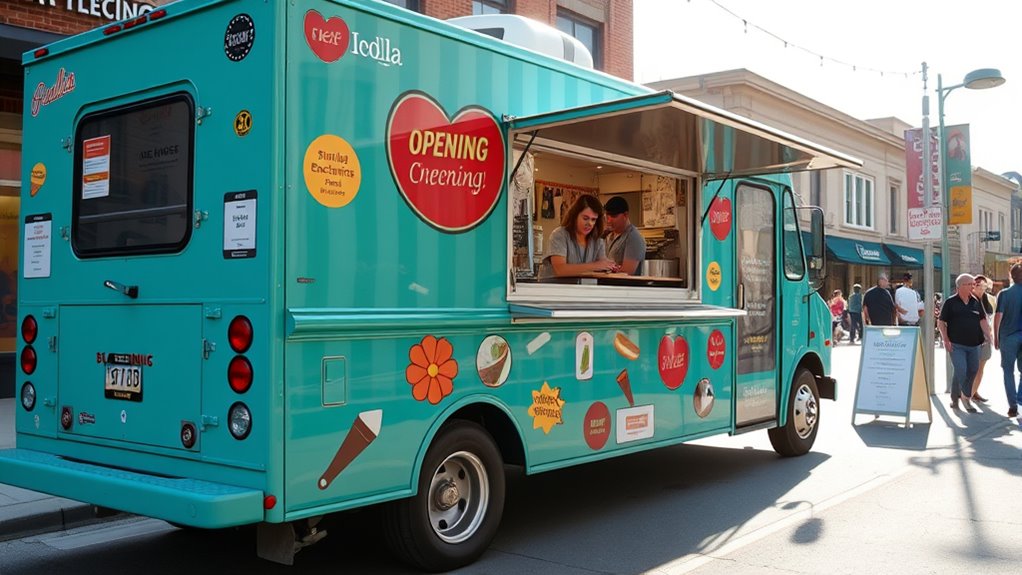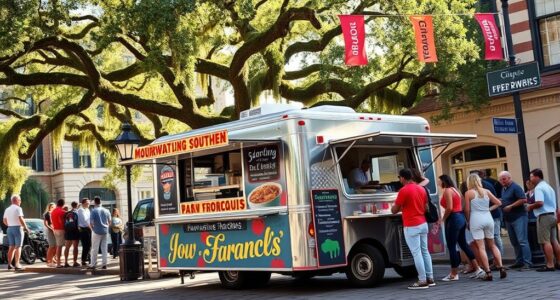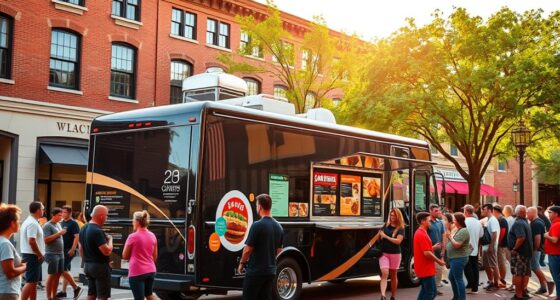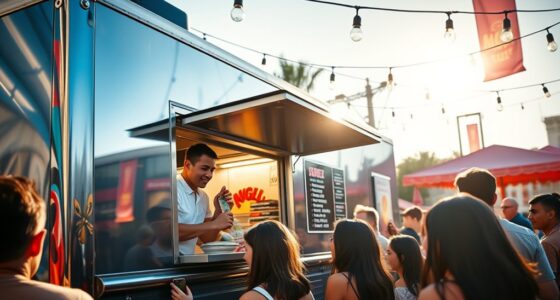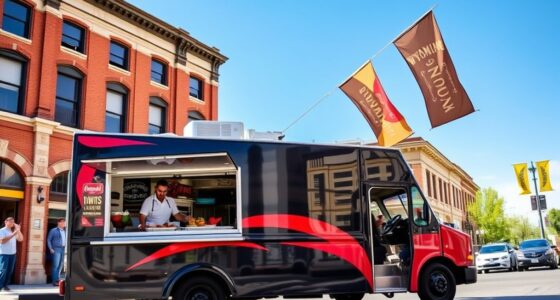To open a food truck in Bloomington, Indiana, you’ll need a City Mobile Food Vendor License, which costs between $25 and $350, and approval from the Board of Public Works if you plan to operate on public rights-of-way. Expect startup costs of $50,000–$200,000 and monthly expenses around $5,000–$10,000. Choose approved locations, guarantee food safety compliance, and develop marketing strategies to build your customer base. Keep exploring to uncover more tips for a successful launch.
Key Takeaways
- Obtain a Bloomington Mobile Food Vendor License and approval from the Board of Public Works for public space operation.
- Startup costs range from $75,000 to over $200,000, with monthly expenses around $5,000–$10,000.
- Operate on approved private or public property within designated hours (6:30 AM–4:30 AM) and comply with zoning rules.
- Pass Monroe County health inspections, ensure food safety, and secure permits for cooking equipment and fire safety.
- Use social media, participate in local events, and develop loyalty programs to attract customers and build community presence.
Navigating Permits and Licensing in Bloomington
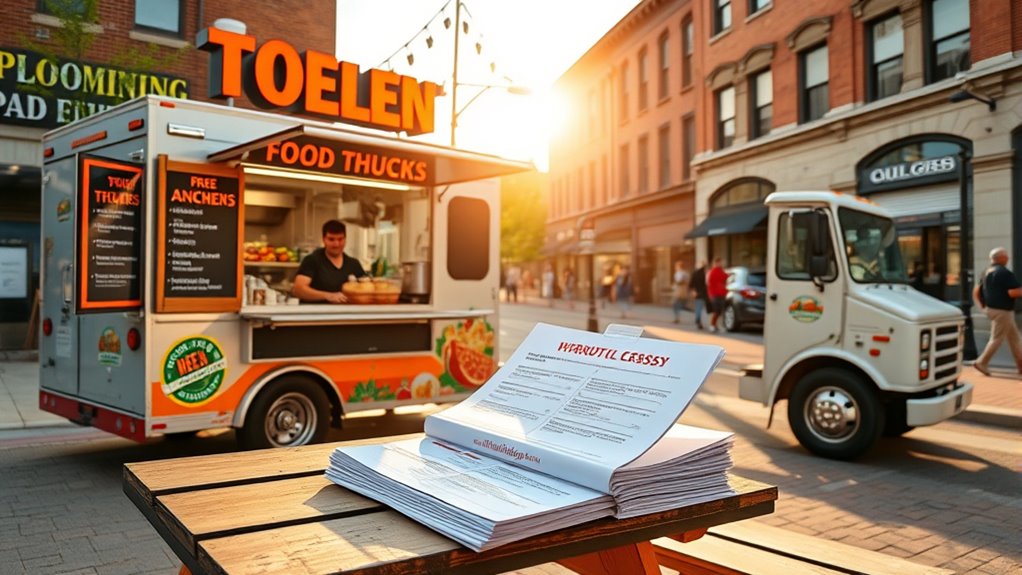
Finding permits and licensing in Bloomington is a essential step when starting your food truck business. You need to obtain a City Mobile Food Vendor License, which is separate from your Indiana Business License and Monroe County health permits. Licenses range from $25 for a one-day permit to $350 for a year, with options for shorter durations. Submit your application at least 10 days before you plan to operate, ensuring you include proof of vehicle safety inspections and compliance with city codes. If you want to operate in public rights-of-way, you may also need approval from Bloomington’s Board of Public Works. Be prepared to provide documentation such as proof of health inspections, vehicle certifications, and business registration. Staying compliant with licensing requirements keeps your food truck legal and ready to serve customers. Additionally, obtaining the proper permits helps prevent potential fines or shutdowns, and understanding regulatory compliance can streamline your start-up process.
Understanding Costs and Fees for Food Truck Operations
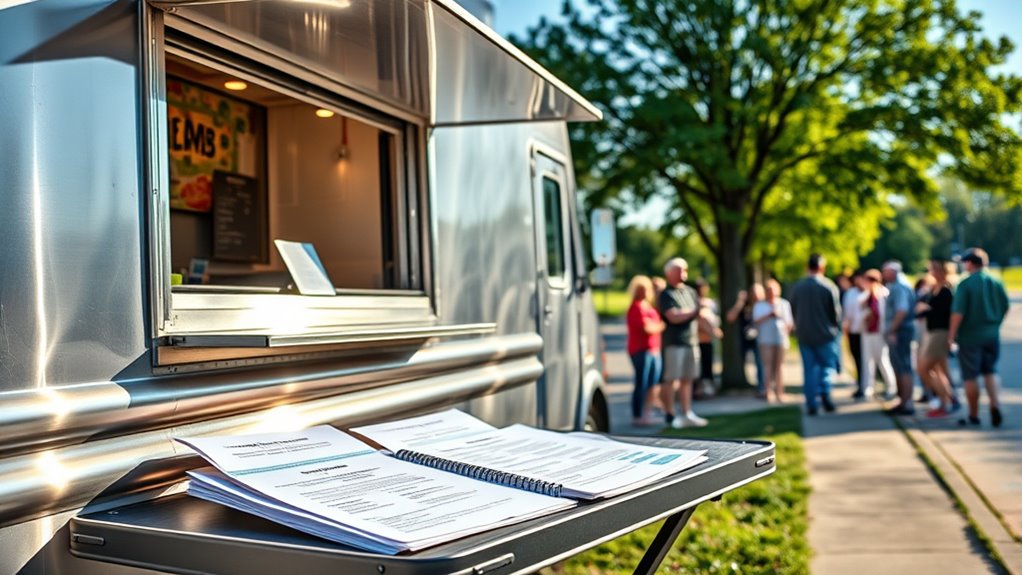
Once you’ve secured the necessary permits and licenses in Bloomington, understanding the costs involved in operating your food truck becomes essential for planning and profitability. Initial investments vary widely, with new trucks costing $75,000–$200,000, and used options ranging from $50,000–$100,000. Renting a truck typically costs $2,000–$3,000 monthly. Startup inventory and equipment need around $2,000–$3,000 upfront. Licensing, permits, and insurance can total from $1,800 to over $28,000. Monthly operating costs usually fall between $5,000 and $10,000, covering food, labor, fuel, and maintenance. Costs fluctuate based on location, route, and menu complexity, impacting your profit margins considerably. Additionally, understanding the bedroom design elements can help create a welcoming environment for staff or clients if your food truck includes a seating area.
Choosing Approved Locations and Operating Restrictions
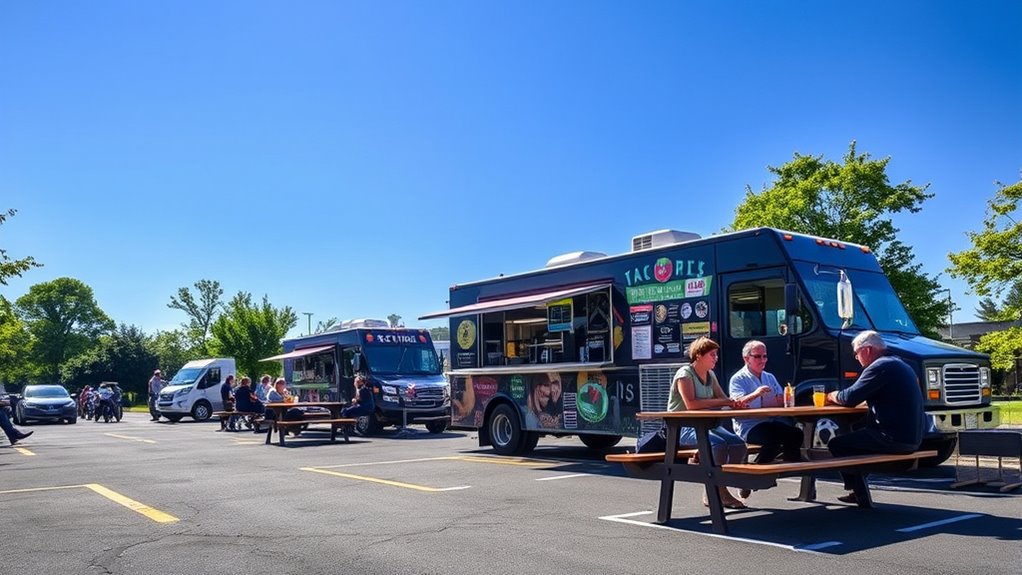
Choosing the right location is crucial for your food truck’s success in Bloomington, but you must verify your spots are approved and compliant with local regulations. You can operate on public property or private property with permission. High-traffic areas like parks and downtown spaces attract customers, but they often require permits. Operating on the public right-of-way needs approval from the Board of Public Works. Additionally, your location must align with zoning and licensing rules, preventing unauthorized parking. Be aware that some locations may have restrictions such as discoloration or mold, which could affect your compliance and safety standards. Consider these key points: 1. Food trucks must operate on permitted public or private sites. 2. Official events like Food Truck Friday offer approved spots. 3. Operating hours are restricted from 6:30 AM to 4:30 AM. 4. Location approvals often require permits, inspections, and compliance with community guidelines.
Ensuring Food Safety and Equipment Compliance
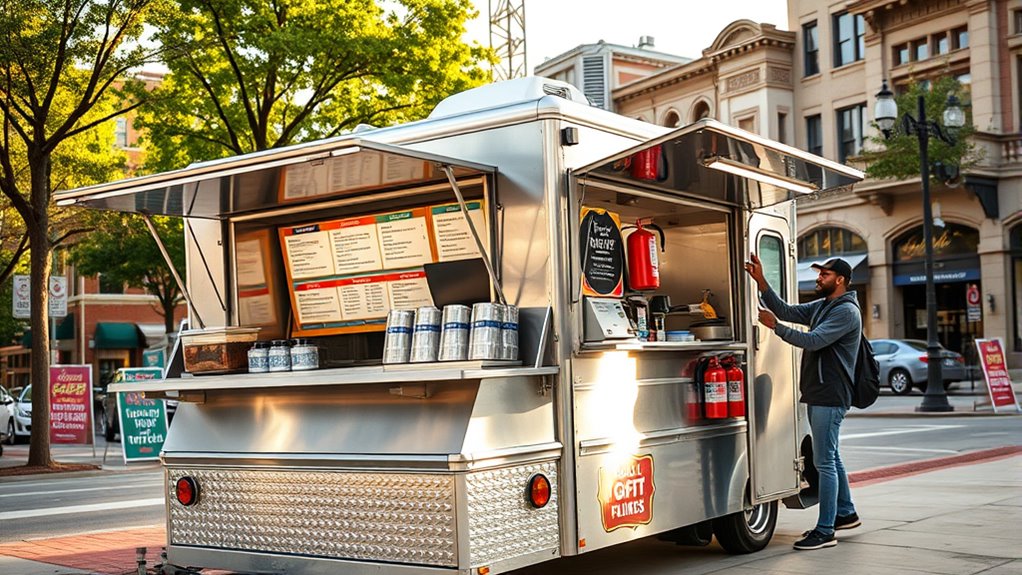
To keep your food truck compliant and safe for customers, you need to prioritize food safety planning and equipment standards. First, obtain a license from the Department of Economic Development and pass a health inspection from Monroe County. Submit detailed plans, including floor layout, menu, equipment list, and plan review questionnaire. A pre-opening inspection is mandatory to verify compliance. Ensure your food is prepared at an approved commissary or on-site, and avoid homemade or home-canned foods. Install hand sinks inside the truck and secure all equipment properly. Use food-grade hoses for water and keep storage areas free of pests and contaminants. If cooking with flames, secure necessary permits, maintain safe distances from buildings, and have fire safety equipment on hand. Proper equipment maintenance and regular cleaning are essential to prevent issues and ensure safety.
Developing Your Marketing Strategy and Building Customer Loyalty

Developing a strong marketing strategy and building customer loyalty are essential steps to guarantee your food truck stands out in Bloomington’s competitive scene. To succeed, focus on targeted outreach and engagement. Here are key strategies:
A strong marketing plan and loyal customers ensure your food truck’s success in Bloomington.
- Use social media platforms like Facebook to reach your audience, as 75% of food trucks actively engage there, boosting visibility and sales.
- Participate in local events and festivals to increase brand awareness and foster direct customer connections.
- Implement loyalty programs that encourage repeat visits and reward regular customers, which can increase repeat patronage by 30%. Additionally, understanding spiritual energy can help you intuitively connect with your community and tailor your approach to their needs.
- Leverage data analytics and mobile apps to improve targeting, discoverability, and customer experience, leading to higher ROI and stronger community presence. Over 50% of food trucks have implemented loyalty programs, resulting in a 30% increase in repeat visits.
- Consistent, strategic marketing builds lasting customer relationships and guarantees ongoing success.
Frequently Asked Questions
Are There Specific Insurance Requirements for Food Truck Operators in Bloomington?
You need to meet Bloomington’s specific insurance requirements for your food truck. This means carrying proof of commercial auto insurance that meets or exceeds Indiana’s minimum standards, including liability coverage for accidents, injuries, or property damage. You also need general liability insurance for customer injuries or food-related claims. Keep your coverage continuous, submit proof when renewing permits, and get a certificate of insurance from providers experienced with Bloomington regulations.
Can I Operate My Food Truck Year-Round in Bloomington’S Climate?
You can operate your food truck year-round in Bloomington, but you’ll need to prepare for cold, snowy winters. Make sure your truck has proper insulation, reliable heating, and protection against weather elements. Choose sheltered locations like near campus or indoor venues, and adapt your menu to include hot, comforting items. Stay updated on weather conditions, and use marketing strategies to attract customers even during the colder months.
Are There Restrictions on Types of Cuisine Allowed in Bloomington Food Trucks?
Think of Bloomington’s cuisine rules as a well-tended garden—there’s room for variety, but all plants must follow certain guidelines. You’re free to serve any food you like, as long as it’s prepared in approved facilities and meets health standards. No specific cuisine is banned, but you can’t serve homemade or unapproved foods. Just make certain your menu complies with health codes and gets approved before you start serving your unique dishes.
How Do I Renew My Food Truck Permits Annually in Bloomington?
To renew your food truck permits annually in Bloomington, you need to submit a renewal application to the Monroe County Health Department or Bloomington’s City office before the end of February. Guarantee your vehicle passes a safety inspection and provides updated paperwork like compliance documents. Pay the renewal fees, which vary by employee count, and schedule any required health or safety inspections. Contact the health department or city offices for guidance and submission details.
What Are the Parking Regulations for Food Trucks During Special Events?
During special events, you must get prior approval from the event coordinator or Bloomington’s Board of Public Works before parking your food truck near or on city property. You can’t park within a block of the event unless approved, and you must stay in authorized areas like designated parking lots. Confirm your truck doesn’t block sidewalks or entrances, maintains proper distance from buildings and other trucks, and complies with time restrictions to avoid penalties.
Conclusion
So, now that you know the endless maze of permits, costs, and restrictions, you’re practically ready to conquer Bloomington’s food scene—assuming you enjoy paperwork and parking battles. Just remember, in the world of food trucks, the real secret ingredient is patience (and maybe a dash of caffeine). With your menu, marketing, and licenses lined up, all that’s left is to hope your customers love your food more than they love parking tickets. Good luck!
